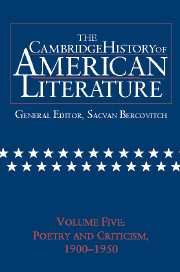Book contents
- Frontmatter
- Introduction
- MODERNIST LYRIC IN THE CULTURE OF CAPITAL
- POETRY IN THE MACHINE AGE
- LITERARY CRITICISM
- Prologue
- 1 Inventing American literature
- 2 Intellectuals, cultural critics, men and women of letters
- 3 Southerners, Agrarians, and New Critics the institutions of modern criticism
- Chronology 1910–1950
- Bibliography
- Index
3 - Southerners, Agrarians, and New Critics the institutions of modern criticism
from LITERARY CRITICISM
Published online by Cambridge University Press: 28 March 2008
- Frontmatter
- Introduction
- MODERNIST LYRIC IN THE CULTURE OF CAPITAL
- POETRY IN THE MACHINE AGE
- LITERARY CRITICISM
- Prologue
- 1 Inventing American literature
- 2 Intellectuals, cultural critics, men and women of letters
- 3 Southerners, Agrarians, and New Critics the institutions of modern criticism
- Chronology 1910–1950
- Bibliography
- Index
Summary
The major Southern New Critics are John Crowe Ransom, Allen Tate, Robert Penn Warren, and Cleanth Brooks, but to refer to them as “critics” does them an injustice. It confines the scope of their achievements, just as the term “New Critic” itself names a movement that these writers launched but that their practice moved beyond. As Warren said, in an interview in 1957, the New Criticism is “a term without any referent, or with too many referents.”
Even to identify Warren (1905–89) as a literary critic is misleading, for he excelled in a number of fields. His early publications included a biography of the abolitionist John Brown (1929), a collection of poems (1935), and a novel, Night Rider (1939). These writings established the pattern of disciplined engagement with a variety of genres that he maintained. Before his involvement with the New Criticism in the late 1930s and 1940s, Warren had already taken part in two other important groups in Southern culture and American literature: the Fugitive poets, based at Vanderbilt University in Nashville, Tennessee; and the Agrarian reformers and polemicists who spoke out against industrialism in the controversial volume I'll Take My Stand (1930).
Warren did much to define and institutionalize New Critical methods, above all through the influential textbook, Understanding Poetry (1938), that he and Brooks wrote. But the scope of Warren's literary achievement, in All the King's Men (1946) and ten other novels, poetry (fifteen volumes in all), short stories, and historical meditations – Segregation: The Inner Conflict in the South (1956), The Legacy of the Civil War (1961), and Who Speaks for the Negro? (1965) – shows that his New Critical commitments coexisted with (and were informed by) evolving attitudes toward history, politics, regionalism, nationhood, and race relations.
- Type
- Chapter
- Information
- The Cambridge History of American Literature , pp. 486 - 576Publisher: Cambridge University PressPrint publication year: 2003
- 1
- Cited by

